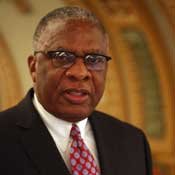This story has been updated to reflect a correction.
The Mississippi Center for Justice says short-term lenders donate heavily to legislative banking committee chairmen in hopes of extending an exemption allowing them to charge up to $21.95 for every $100 loaned.
Short-term lenders comprised 10 of 21 donations Senate Business and Financial Institutions Committee Chairman Gary Jackson, R-French Camp reported from January to December in 2008, a total of $5,100 out of his total $14,700 for that period. House Banking Committee Chairman George Flaggs, D-Vicksburg, meanwhile, reported $4,900 out of his $64,950 total contributions from short-term lenders in 2008 and $5,100 out of his $43,675 total contributions from short-term lenders in 2009.
"It's the history of the industry to contribute to political campaigns in an effort to secure their special exception to the Small Loan Act. It would be expected to see an increase in contributions due to the fact that this exception, which expires in 2012, will see legislative action in the upcoming session," said Mississippi Center for Justice Advocacy Director Beth Orlansky. "Basically, they are protecting the way the industry conducts business in the state of Mississippi."
Orlansky said MCJ does not donate money to campaigns.
Flaggs said the suggestion of donors influencing his vote on the bill was an "attack" on his character. "The question is an insult to me. ... I take campaign contributions from pharmaceutical companies, and yet I voted against their interests. I've been in the Legislature for 23 years, and I've always voted on the merits of the issue."
The representative defended the $21.95 fee, reiterating the lenders' position that they can't stay in business if their exemption expires. He said the $21.95 fee compares favorably to credit-card companies' fines and fees that grow considerably when they become delinquent. He said the fee also compares favorably to the cost of re-activating cell phone and electricity service.
Jackson did not return calls.
In 1998, legislators passed the Check Cashers Act, which exempts payday lenders from a 36 percent annual-percentage-rate cap on loans less than $1,000. Under the exemption, check-cashing operations can charge customers a $21.95 lending fee per $100 loan--which are typically due within two to four weeks. The Mississippi Department of Banking and Consumer Finance calculates the fee into an annual percentage rate (APR) of 572.26 percent.
Jamie Fulmer, vice president of public affairs for Advance America, said the APR is not a fair translation of the interest rate, however, considering the short lifespans of the loans, which, under Mississippi law, cannot last a whole year or charge more than 18 percent simple interest.
"An APR calculation isn't how a consumer values it. In order to pay a (572 APR), the consumer would have to take out that loan every two weeks for an entire year," Fulmer said. "On average, they use us between seven and eight times a year."
The exemption is temporary and set to expire July 2012. Payday lending advocates say most payday lenders can't stay in business charging 36 percent APR on $100 loans.
Fulmer says that capping the APR at 36 percent pushes a short-term loan into an incompatible unit of measurement, which would amount to an unsustainable fee of $1.38 per every $100 loaned, he said.
To get a short-term payday loan, a borrower hands a payday lender a personal check, which the lender holds until the loan's due date. In exchange, the borrower receives cash from the lender, minus the lender's fees.
Companies like Advance America, on Ellis Avenue, offer a $330 maximum payday loan, requiring a fee of about $60. The lender typically holds the borrower's check for about two weeks--the length of a regular pay period--and will deposit the customer's check at the end of the period, as per the contract.
The practice puts the borrower at risk of bank overdraft charges, as well as a lender fee up to $30, if they don't have the money in the bank to cover the draft. Under state law, borrowers may not extend the same loan, but Orlansky argues that some payday borrowers begin a cycle of taking out subsequent loans with different payday lending companies to fund previous loans.
Borrowing $300 can accrue $65.85 in fees. If the borrower takes out eight $300 loans, he is looking at up to $526.80 in fees.
Flaggs said he was going to hold a hearing next year where both sides of the argument can debate a bill scribed by Mississippi Department of Banking and Consumer Finance Commissioner John Allison. "It's not even going to be my bill. It's going to be a bill put together by the state banking commission, which licenses (short-term lenders)," Flaggs said.
Allison said it was too early to submit any bill recommendation but said the existing statute will be tweaked in a number of ways. "There will be several introductions out there, although I don't know what all they're going to be," Allison said.
CORRECTION: A previous version of this story reported that Flaggs' total contributions in 2008 totaled $81,000. The correct amount is $65,950. Also, the figure was originally reported as $8,1000. We apologize for the errors.



Comments
Use the comment form below to begin a discussion about this content.